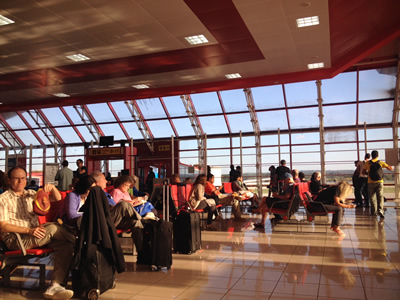
This time she couldn’t enter the terminal to watch him leave. A sign warns that the interior of José Martí International Airport can only be accessed by travelers, not their companions. So she said goodbye at the door. He is the second son who has left since Immigration and Travel Reform was implemented a year ago. For her, like so many Cubans, it’s been a year of goodbyes.
In the first ten months of 2013 some 184,787 people traveled outside the Island. Many of them for the first time. Although the official statements try to deny that people flee the country, more than half of all travelers hadn’t returned as of the end of November. Nor do we need the numbers. It’s enough for each of us to just look around to quantify the absences.
From the personal and family point of view each trip can transform a life. Whether escaping for good from a country where you don’t want to live, learning what exists on the other side, rediscovering relatives or simply some time away from the daily routine. The question is whether the sum of all these individual metamorphoses serves to change a nation. The answer — as with so many things in the world — can be a “yes” and a “no.”
In the case of Cuba, the departures have served, in part, as an escape valve for the dissent. The most rebellious sector of society packed its bags to leave for a short or a long time. The government took advantage of this and also of the material benefits of the journeys, which result in more remittances sent, more imported consumer goods, and more airport taxes collected. The smokestack-free travel industry.
For civil society activists who took international tours, the opportunity was extraordinary. Bringing their voices to places where, before, only officialdom was heard, has already been a good step forward. They have been able to get closer to the topics debated in the world today and this has helped them to modernize their approaches, to better define their civic role and to involve themselves in issues that transcend national frontiers.
During all this time, however, they have refused to let the former prisoners of the Black Spring travel outside the country. Also the number of exiles blocked from entering Cuba has maintained an upward trend. Lamentably, after the huge headlines announcing Decree-Law 302, those dramas did not find sufficient coverage in the international press or organizations.
A good part of the population still can’t afford a passport. For all these Cubans, the Immigration and Travel Reform takes place only in the lives of others, on television screens, or in the pages of newspapers. Coincidentally, this is the same sector that still has not been able to contract for a mobile phone, stay in a hotel, or even peek into the markets for houses and cars.
So 2013 was a mix of suitcases, goodbyes, returns, names added to phone directories, sighs, long lines outside the consulates, reunions, listings of homes for sale to pay for airplane tickets… A year for leaving and a year for staying.
13 January 2014
